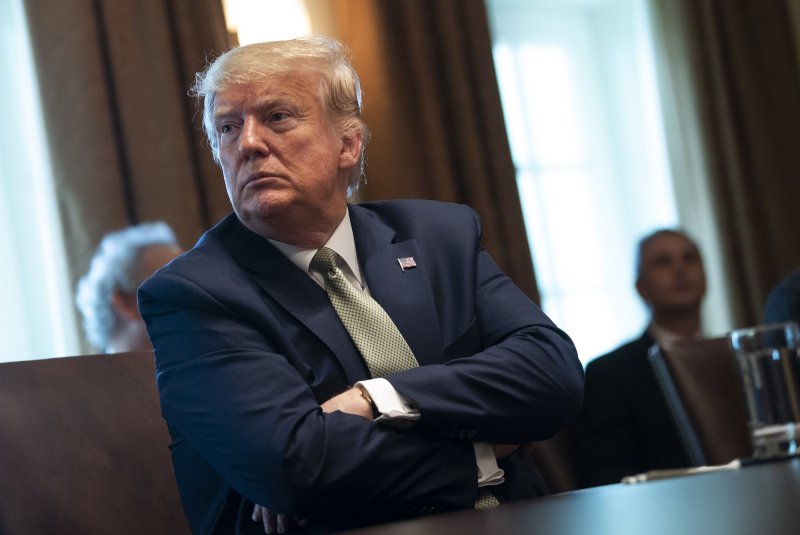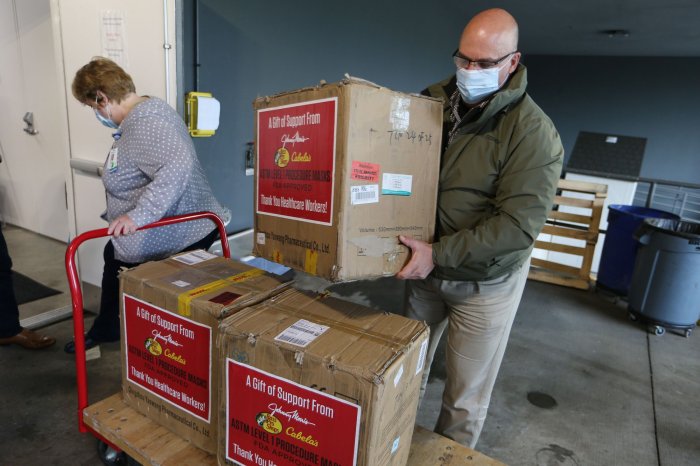1 of 3 | President Donald Trump meets with tourism industry executives to discuss the response to the coronavirus on Tuesday. Photo Kevin Dietsch/UPI |
License Photo
Coronavirus, COVID-19, is the immediate threat to the nation's well-being. How it spreads, the impact on the economies and on the social fabric, not only of the United States but other nations, are unknowable.
Conceivably, hundreds of millions and even billions could be infected. On the other hand, the actions taken by South Korea, Singapore and Taiwan to combat the virus seem to have worked. Whether these actions are transportable is also unknown.
Lurking, however, are three other viruses of a political nature that will have long-term impact on the United States. The first is the failure of the federal government to govern. Second is presidential contender Bernie Sanders. And last is President Donald Trump.
For too long, I have warned that the failure of governments to govern is among the greatest threats to societies at large, especially in the West. That the Senate chose to leave Washington last Friday while the House was about to vote on a rescue package to deal with COVID-19 was outrageous and a collective dereliction of duty. Fortunately, state and local governments appear to be taking more serious and professional actions to counter this pandemic.
Among the causes of this failure to govern have been the virulent effects of ultra-partisanship and excessive politicization. The old Republican Party has disappeared. And the Democratic Party is moving hard left, driven so by factions that demand a revolution against large corporations, the rich and the elites.
In that regard, while it appears likely that former Vice President Joe Biden will win his party's presidential nomination, Sanders refuses to concede and continues his quest to be the candidate. In my view, Sanders intends to impose some of his most radical policies and promises on Biden and his platform. The quid pro quo is Sanders' support and, of course, that of his supporters.
Should Biden be forced or persuaded to adapt some of Sanders' policies that Republicans will attack as "socialist," Trump will be the beneficiary. As Trump observed, "America is not and never will be socialist." Too many of Sanders' programs are not only unaffordable. His healthcare, free education and relief of student debt plans are unworkable.
As Trump has eviscerated traditional Republican preferences for fiscal prudence and international engagement, Sanders risks "socializing" the Democratic Party. This politically viral infection will accelerate further distancing from the center where a majority of Americans reside.
Unfortunately, Trump is exactly the wrong person to be president during a crisis. The reason is that he is the face of extreme partisanship and politicization. Worse, Trump's inability to rally the nation and indeed to be seen as trustworthy, credible and believable, given his track record of ignoring or dismissing facts and truth, deprive the public of the leadership that is desperately needed. In past crises, Presidents Ronald Reagan, George H.W. Bush, Bill Clinton, George W. Bush and Barack Obama were able to provide leadership despite politicization and often harsh personal attacks against each.
Public views on COVID-19 are split along party lines, adding to this crisis of confidence. Some 85 percent of Republicans believe the administration is handling this crisis. An equal percentage of Democrats believe the opposite. As Abraham Lincoln observed, "A house divided against itself cannot stand." If mishandled, unless COVID-19 magically evaporates, we face another divided house.
While this is not World War II, more Americans could succumb to this disease than in that conflict. Yet, the nation needs a World War II-like response to COVID-19. Franklin D. Roosevelt's address to Congress immediately after the attack on Pearl Harbor rallied Americans, even as the Pacific battleship fleet was in ruins.
Can Trump rise to the challenge? Like FDR and in other crises, could Trump address a joint congressional session to bring the divided nation together? Or would that simply widen the divide? And if not Trump, who?
Compounding these uncertainties was the dismal performance of federal agencies last weekend in failing to anticipate the need for processing thousands of Americans landing in major airports who might be infected with COVID-19.
Two actions are essential. First, the nation needs a comprehensive plan for defeating the spread and recurrence of COVID-19 medically, economically and socially. Congress must play a crucial role, but only if it can overcome its partisan divisions.
Second, the administration and the president in particular must inform the public on a factual and scientific basis and not the whims or impulses that have characterized Trump's prior statements and tweets. For example, the public was promised 4 million COVID-19 test kits by last weekend. That did not happen.
We won World War II. We must prevail over COVID-19. Will we?
Harlan Ullman is a senior adviser at the Atlantic Council. His latest book is "Anatomy of Failure: Why America Has Lost Every War It Starts." Follow him @harlankullman.
Bass Pro Shops marketing manager David Smith (R) carries a box of donated face masks into Mercy Health in Chesterfield, Mo., on May 13. The company is donating 1 million FDA-approved ASTM Level 1 Procedure Face Masks to healthcare workers and first responders working on the front lines of the pandemic. Photo by Bill Greenblatt/UPI |
License Photo
















